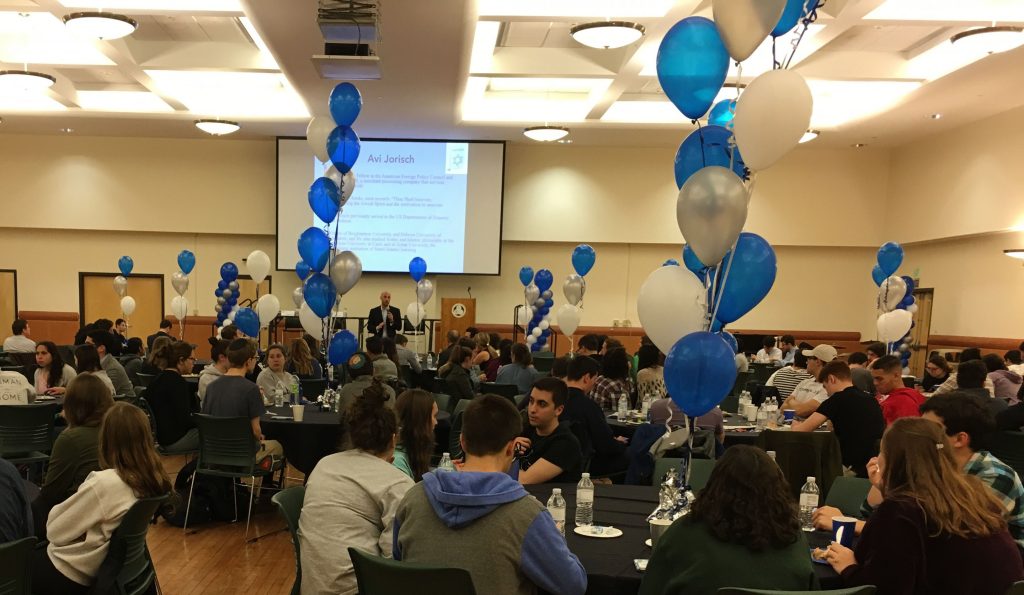
Over one billion people currently don’t have access to clean water, according to the World Wildlife Fund.
In an effort to draw attention to this water crisis and the Israeli technology used to help combat it, 1948 Co. hosted the Water Gala on Monday night. Around 200 students packed into the Mandela Room for the event, which included speakers, tabling by student organizations, live music and food.
1948 Co., a project that aims to raise awareness about Israeli innovations in technology, philanthropy and humanitarian aid, was founded by Enactus, a network of students and mentors who work to engage young entrepreneurial leaders to use innovation and business principles to better the world, according to its website.
Members of 1948 Co. pitched the idea for a water-related event to the World Jewish Congress and the Israel’s Consulate in February 2018, alongside groups from Cornell University, New York University and the University of Pittsburgh. 1948 Co. won a $10,000 grant from the two organizations and used the award to pay for the speakers, transportation, food and geotag for the Water Gala.
The grant was designed to award a group that could bring a unique side of Israel to its college campus. Three of the speakers at the Water Gala are involved with Israel in different ways. They discussed Israel’s connection with the water crisis through technological, political and humanitarian lenses.
Talia Chasen, an organizing member of 1948 Co. and a sophomore majoring in psychology, said the ultimate goal of the event was to raise awareness about the crisis.
“The water crisis is a huge issue, and we believe in helping by starting small,” Chasen said. “We hope to cause a ripple effect — first starting in this room, then to the rest of the school, to surrounding cities, the state and on and on until everyone knows about it.”
The Gala’s keynote speaker, Avi Jorisch, ’97, is the founder of Integrity Merchant Solutions and author of five books including his most recent, “Thou Shall Innovate.” During Jorisch’s talk, he shared several stories from his life, including one about the moment he decided to get involved in the technology field while living in Jerusalem.
According to Jorisch, Israel is 60 percent desert and extremely lacking in natural resources, yet it is the only country in the world to be water independent, which means that it doesn’t rely on any neighbors or weather for water. This has helped establish Israel as a major leader in water technologies, which include pumps that transform ocean water into drinking water, drip irrigation systems and systems that recycle toilet water to be used in agriculture.
Al Vos, a professor of English and the faculty master of Hinman College, said Jorisch’s talk helped him understand the importance of the United States’ role in the water crisis.
“[Jorisch] was a terrific speaker with a message that really hit home,” Vos said. “I emerged with a renewed sense of the need for the United States to become more proactive in water-use policy and practice.”
Student groups also tabled at the event to spread awareness of water issues happening around the world. Students spoke about the water problems in Flint, Michigan, Africa’s water crisis and Puerto Rico’s lack of clean water after Hurricane Maria hit the island in 2017.
Other speakers at the Water Gala included Robert Holahan, an environmental science and political science professor at BU; Toumai Kafri, a representative from IsraAID; and Galit Peleg, head of the department for public diplomacy and academic affairs at the Consulate General of Israel in New York. These speakers, along with Jorisch, participated in a panel and took questions from students at the event.
During the panel, students asked how they can actively help mitigate the water crisis, and Kafri suggested utilizing the resources that college students have available to them.
“College is a time with substantial connections, resources and space to work,” Kafri said. “It’s just a matter of using as much of it as you can.”


